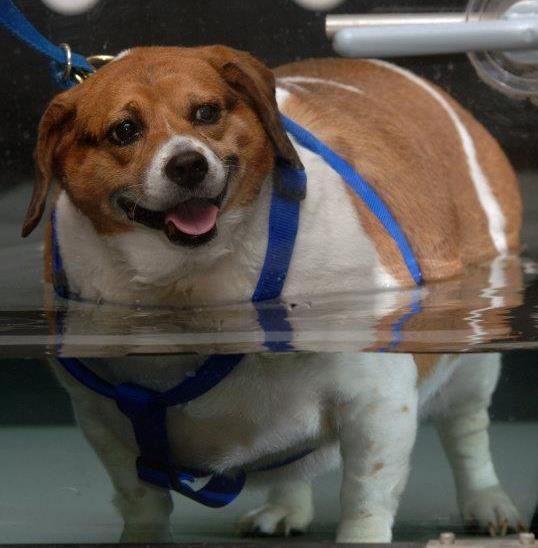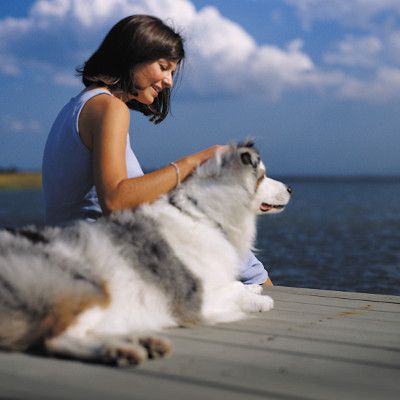By Dr. Tracy Dewhirst for Exceptional Canine

Following an injury or surgery, physical therapy can be a game-changer for recovery time. If you’ve ever needed PT, you fully understand this. Physical therapy increases mobility and the use of affected areas and often decreases the need for medications.
And physical therapy makes a difference for recovering dogs too. At The University of Tennessee College of Veterinary Medicine (UTCVM) in Knoxville, Tennessee, physical therapy is prescribed for dogs now more than ever. In fact, the demand for physical therapy has increased so much that the department has grown from two rooms off a small, forgotten hallway to a special wing with an exercise studio, therapy rooms and aquatic facilities.
A Cutting-edge Physical Therapy Program for Dogs
 Dr. Marti Drum runs the animal physical rehabilitation center, a state-of-the-art facility that includes treadmills (both ground-level and underwater), a heated pool, exercise equipment such as physioballs and balance boards, and techniques such as electrical stimulation, extracorporeal shockwave therapy, therapeutic ultrasound, low-level laser, acupuncture, and hyperbaric oxygen therapy.
Dr. Marti Drum runs the animal physical rehabilitation center, a state-of-the-art facility that includes treadmills (both ground-level and underwater), a heated pool, exercise equipment such as physioballs and balance boards, and techniques such as electrical stimulation, extracorporeal shockwave therapy, therapeutic ultrasound, low-level laser, acupuncture, and hyperbaric oxygen therapy.
Rehabilitation encompasses many aspects of healing. While therapy for musculoskeletal problems is most commonly discussed, rehabilitation also improves outcomes for patients with neurologic deficits, poor-healing wounds and bones, and even cancer.
An average day for Drum includes assessing new patients with physical exams and monitoring the progress of the familiar faces. She observes dogs in session and adjusts their therapy based on progress. She also encourages her patients to push harder and give a little more. It’s much like watching a specialized trainer working with an athlete. Drum is in tune with the animal’s limitations and is fully aware of what it can accomplish.
Physical Therapy Helps Senior Dogs
 More than 40 percent of UTCVM’s therapy patients are not referred because of trauma or surgery but because of pain and limited mobility caused by osteoarthritis. Geriatric dogs -- or typically those over the age of 10 -- often need physical therapy to improve mobility, strengthen muscles and decrease pain associated with arthritis.
More than 40 percent of UTCVM’s therapy patients are not referred because of trauma or surgery but because of pain and limited mobility caused by osteoarthritis. Geriatric dogs -- or typically those over the age of 10 -- often need physical therapy to improve mobility, strengthen muscles and decrease pain associated with arthritis.
The geriatric arthritic cases typically start with two or three therapy sessions a week. Each specialized visit focuses on the stage of improvement, range of motion of effected joints, and exercises to increase strength, flexibility and stamina. These efforts help tissues heal, remodel and become stronger.
Patients go home with physical therapy homework -- exercises for the owner to implement and incorporate into the dog’s daily life. Dogs who have daily home therapy typically improve at a faster pace; it’s easy to recognize dogs that did not do their homework.
After several weeks, most geriatric patients need therapy once a week for maintenance. Drum says many dogs can succeed on their own. However, some owners return for weekly workouts because their dogs are noticeably better with professional therapy.
“Not all dogs need physical therapy, but all dogs do benefit from it,” explains Drum.
Canine rehabilitation centers can be found in most large cities. Ask your veterinarian for a recommendation if you would like to have your dog assessed for physical therapy.
Dr. Tracy Dewhirst, a graduate from the University of Tennessee College of Veterinary Medicine, practices small-animal and equine medicine in Knoxville, Tenn. She is a long-time columnist for the Knoxville News Sentinel. Dewhirst also sits on the East Tennessee Peer Review Board. Dr. Dewhirst blogs frequently for Exceptional Canine.





